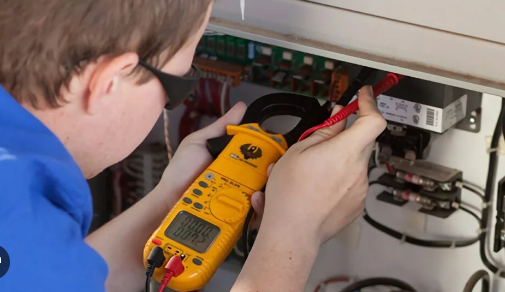Requirements for an Electrical technician role

An Electrical Technician is a professional who works with electrical systems, circuits, and equipment. They assist in the installation, maintenance, and repair of electrical devices such as HV, MV and LV switchgears, Motor and motor starters, troubleshoot electrical problems, and ensure that systems comply with safety regulations. Electrical technicians work under the guidance of electrical engineers or senior technicians. The following are requirements for an Electrical technician role.
Educational Qualifications
- Diploma or Associate Degree in Mechanical Engineering Technology, Mechanical Engineering, or a related field.
- Some positions may prefer a Bachelor’s degree in electrical Engineering or electrical Engineering Technology.
- Certifications (optional but advantageous) in specialized areas like CAD, CNC machining, or specific industry-related software.
Technical Skills for an Electrical technician to have
Having the listed technical skills is one of the requirements for an Electrical technician role
- Knowledge of Electrical Systems
- Circuit troubleshooting Skills
- Competence in installing electrical systems, including wiring, outlets, switches, and circuit breakers.
- Proficiency in carrying out electrical test
- Knowledge of local electrical codes and safety regulations to ensure compliance during installation.
- Ability to perform routine maintenance on electrical equipment and systems to ensure optimal operation and longevity.
- Familiarity with PLCs and their programming for automation and control systems.
- Computer and Software Skills
Practical Experience
- Previous Work Experience: Employers often prefer candidates with prior work experience as a mechanical engineering technician, especially in a manufacturing, design, or production setting.
- Internships or Apprenticeships: Practical training or internships can be crucial, as they provide hands-on experience in real-world mechanical applications.
Soft Skills
- Problem-solving Skills
- Attention to Detail
- Communication Skills
- Teamwork
- Time Management
Certification and Licensing requirements for an Electrical technician
- Certified Engineering Technician (CET): Some regions or employers may require or prefer certification as an electrical engineering technician from recognized professional bodies such as National Institute for Certification in Engineering Technologies (NICET) in the United States, Engineering Council UK, with various institutions like IMechE, ICE, and IET in the United Kingdom.
- Occupational Safety Certification: Certification in workplace safety and handling of hazardous materials (e.g., OSHA or HSE certification) may be beneficial.
Key Responsibilities of an Electrical technician
- Installation: Install wiring, outlets, switches, circuit breakers, and other electrical components in buildings, industrial equipment, or machinery.
- Maintenance and Repair: Perform inspections and repairs on electrical systems, ensuring everything is functioning properly and safely.
- Troubleshooting: Diagnose and resolve issues in electrical systems, from faulty wiring to malfunctioning devices.
- Testing: Use testing equipment (e.g., multimeters, IR meters) to test circuits, systems, or devices to ensure they meet safety and performance standards.
- Safety: Follow strict safety protocols when working with electrical systems to prevent hazards like electrical shocks, fires, or equipment damage.
- Documentation: Maintain accurate records of electrical work, repairs, and system performance.
Also check: Requirements for a maintenance engineer role | Must have skill for a mechanical technician